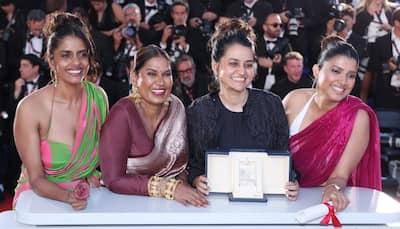
New Delhi: History was made at the 77th Cannes Film Festival as Payal Kapadia’s groundbreaking film “All We Imagine As Light” took home the prestigious Grand Prix, marking a significant milestone for Indian cinema on the international stage. The awards ceremony, held on the final day of the Cannes 2024 festival, saw Kapadia in attendance with the film’s stellar cast, including Kani Kusruti, Divya Prabha, and Chhaya Kadam. This victory not only celebrates the film’s achievements but also ends a 30-year dry spell for India at Cannes.
To underscore the magnitude of this win, it’s essential to revisit the remarkable history of Indian cinema at Cannes. The Cannes Film Festival, initially devised to commence in 1939, was suspended due to the outbreak of World War II following Germany’s invasion of Poland. The festival finally began in 1946, and in its inaugural year, Indian cinema made a substantial impact. In a move that aimed at promoting post-war peace and reconciliation, the competition jury bestowed the top prize, then known as the Grand Prix, to films from 11 of the 18 participating countries, India included.
The pioneering Indian film that won Cannes’ grandest honor was Chetan Anand’s social-realist drama “Neecha Nagar.” This victory established India as a significant player in the global cinematic arena and made regular Indian entries in Cannes a norm for nearly a decade. Another milestone was reached with the debut feature by the legendary director Satyajit Ray. His film “Pather Panchali” earned the unique distinction of Best Human Document, thereby cementing India’s esteemed position in the world of cinema.
Fast forward to 2024, Mumbai-based filmmaker Payal Kapadia has achieved an extraordinary feat with her fiction feature debut, “All We Imagine As Light.” Filmed over 25 late summer days in Mumbai, with an additional 15 days in the rain-soaked western port town of Ratnagiri, the Malayalam-Hindi language feature delves into the lives of two young women — Prabha, a nurse from Mumbai, and her roommate Anu. This compelling narrative has been lauded for its profound storytelling and has rightly earned the Grand Prix, the second-most prestigious award at Cannes, following the Palme d’Or.
.
The film’s success at Cannes speaks volumes about its compelling storyline and powerful performances. The main competition jury, chaired by renowned filmmaker Greta Gerwig, comprised an illustrious panel that included Spanish director Juan Antonio Bayona, Turkish actor-screenwriter Ebru Ceylan, Italian actor Pierfrancesco Favino, American actor Lily Gladstone, Japanese director Hirokazu Kore-eda, Lebanese actor-director Nadine Labaki, and French stars Eva Green and Omar Sy. These notable names in the film industry collectively acknowledged the brilliance of Kapadia’s work, further amplifying its global recognition.
Reiterating the festival’s historically tumultuous beginnings, it’s notable that the initial plan for Cannes in 1939 was thwarted by the advent of World War II. However, once the festival gained traction in 1946, it became a stage for reconciliation through art, and Indian cinema played a pivotal role in this mission. The 1946 edition saw Grand Prix awards shared among 11 countries, including India, which was honored for Chetan Anand’s “Neecha Nagar,” a film deeply rooted in social realism.
The decade following this victory was a golden era for Indian cinema at Cannes, marked by regular submissions and recognitions. The extraordinary achievements of the likes of Chetan Anand set a precedent, and Satyajit Ray’s “Pather Panchali” in the mid-1950s elevated the status of Indian cinema yet again with its poignant storytelling and emotional depth.
This legacy finds a contemporary echo in Payal Kapadia’s achievement with “All We Imagine As Light,” marking the end of a 30-year lull period for India at this prestigious festival. The film, a Malayalam-Hindi language feature, intricately weaves the story of Prabha and Anu, exploring themes of aspiration, struggle, and resilience. The accolades garnered by the film underline the creative resurgence within Indian cinema and its escalating influence on a global scale.
In conclusion, the honor bestowed upon “All We Imagine As Light” at the 77th Cannes Film Festival is a historic moment, celebrating not just the film’s artistic success but also the resurgence of Indian cinema on the international forefront. With this win, Payal Kapadia and her team have written a new chapter in India’s cinematic journey, one that will inspire future generations of filmmakers to aspire for global acclaim.












